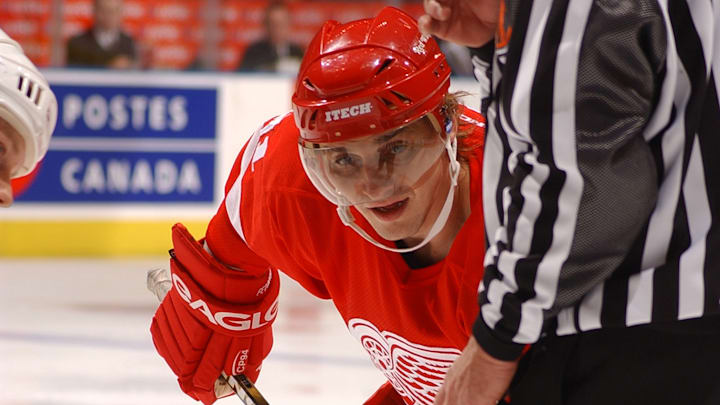There’s something quietly tragic about the way Sergei Fedorov’s story with the Red Wings unfolded.
It’s certainly encouraging to see both sides reconcile and for Fedorov’s number to finally receive the honor it deserves with an official retirement next year. Still, there’s an underlying sense that something remains unresolved. The truth is, none of this had to unfold the way it did.
Both sides have good arguments
After the Red Wings captured the Stanley Cup in 1997, Sergei Fedorov held out for the first 59 games of the following season amid a contentious contract dispute. For context, an NHL regular season spans 82 games — meaning Fedorov was absent for nearly 72% of the year, not due to injury, but in pursuit of a more lucrative deal.
He ultimately signed a front-loaded offer sheet with the Carolina Hurricanes, which the Red Wings matched. The terms were staggering: $14 million upon signing and an additional $2 million for playing just 21 regular-season games.
While Fedorov played a pivotal role in helping Detroit repeat as champions that year, his protracted absence and the financial demands surrounding it left a lasting impression. It’s no surprise that, for all his brilliance on the ice, the organization came to view him as something of a royal headache behind the scenes.
By 2003, the Red Wings extended an offer to Fedorov that would have made him the highest-paid player in the NHL at the time. However, when Fedorov requested additional time to consider the proposal, Detroit abruptly withdrew it — a move that suggested lingering tensions from the 1998 contract standoff had not entirely dissipated. Fedorov, perhaps assuming the past had been forgiven, was likely caught off guard. It hadn’t been.
Frustrated — and arguably justifiably so — he chose to sign with the then-Anaheim Mighty Ducks, the very team that had just eliminated the Red Wings in the first round of the playoffs just months before. For many fans, the decision felt like a betrayal, and the backlash was swift.
The saddest part
What stings most about the entire saga is that Fedorov should have finished his career as a Detroit Red Wing. Instead, he became something of a journeyman — moving from Anaheim to Columbus, and ultimately concluding his NHL career with the Washington Capitals during the 2008–2009 season.
But imagine, for a moment, an alternate ending: had he returned to Detroit before that final season, he would have been part of the 2008 Stanley Cup–winning team. It would have marked his fourth championship with the organization — a fitting, storybook conclusion to a Hall of Fame career. He could have retired at the summit, in the jersey where it all began.
That, perhaps, is what continues to leave a slightly bitter aftertaste for many Red Wings fans. It didn’t have to end this way — but professional sports are rarely sentimental. In a business where pride, memory, and millions of dollars collide, even the deepest ties can fray. This was, regrettably, one of those bitter separations.
And yet, time has a way of softening edges. Fedorov has been welcomed back into the Red Wings family, and he has even left open the possibility of returning one day in a coaching role. What a full-circle moment that would be — and how fitting it would feel.
